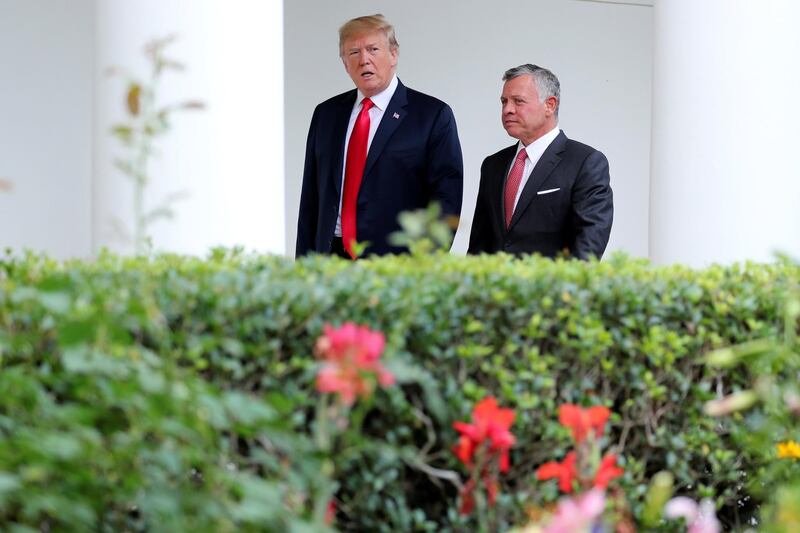King Abdullah has reaffirmed Jordan’s “unwavering” position on Palestine and the two-state solution amid reports of US efforts to remove the issue of Palestinian refugees from negotiations in the Middle East peace plan it is formulating.
Chairing a meeting of the cabinet on Sunday, King Abdullah spoke of his recent meeting with US President Trump and administration officials in Washington DC at which he underlined Jordan’s “steadfast position on the Palestinian cause, which is based on the two-state solution that guarantees the establishment of an independent Palestinian state with East Jerusalem as its capital”, according to a royal court statement.
During the address, a recording of which was published by the royal court on its Facebook and Twitter accounts, the monarch stressed that Jordan had not changed its long-held position on the two-state solution.
“I spoke with the president, the US administration and congress on regional challenges, and most importantly our position on Palestine,” King Abdullah said.
“Our position is steadfast, it will never change,” he said, adding “there is no pressure on Jordan”.
The king's statements come days after Foreign Policy magazine reported that Jared Kushner, Mr Trump's son-in-law and Middle East peace envoy, urged Jordan during an official visit to Amman in June to strip some 2.2 million Palestinians in the kingdom of their refugee status.
The article included emails allegedly from Mr Kushner in which he indicates a desire to “disrupt” UNRWA, the UN Relief and Works Agency for Palestinian Refugees that supports Palestinian refugees in the West Bank, Gaza, Jordan, Lebanon and Syria.
According to a US administration official quoted by the Israeli daily Haaretz, "UNRWA's mandate has perpetuated and exacerbated the refugee crisis and must be changed".
The US position creates an awkward situation for Jordan, where nearly half of its 6.5 million population is of Palestinian origin, 2.2 million of whom are registered with the UN as refugees. The kingdom supports the Palestinian right of return to property they fled during the 1948 creation of Israel and the creation of a Palestinian state with East Jerusalem as its capital. At the same time, it is a close ally of Washington and currently receives more than $1.3 billion annually in US assistance.
_______________
Read more:
[ Jordan warns of 'serious consequences' of revoking Palestinian refugee status ]
Editorial: Cruel demands to strip Palestinians of refugee status leave little faith in US role
_______________
The US efforts to close UNRWA would place further strain on Jordan’s resources as it copes with an influx of Syrian refugees and an ailing economy. The UN agency runs 10 camps that house about 390,000 refugees in Jordan, clinics that provide health care for about 1.1 million, and schools in which 120,000 children are enrolled.
According to Palestinian sources quoted in Jordanian semi-official daily Ad Dustour, King Abdullah and Palestinian President Mahmoud Abbas will meet soon in Amman to discuss the latest developments, which are likely to include the peace plan being drawn up by Mr Kushner, details of which have not yet been officially announced.
In the same report, the Palestinian ambassador to Jordan, Attallah Khairi, welcomed King Abdullah’s statement and said Jordan’s principles and support for the Palestinian cause had not changed and that “no external power will be able to influence them or change them … no matter the size of the pressures.”
Meanwhile US legislators are seeking to restrict US recognition of and assistance to Palestinian refugees to only first-generation Palestinians who were directly uprooted by the 1948 war leading to the creation of Israel.
A bill introduced on July 19 by Republican Congressman Doug Lamborn, the "UNRWA Reform and Refugees Support Act”, would also redirect any assistance provided through USAID - which itself is barred by US law from providing humanitarian assistance to the Palestinian Authority because of its alleged support of families of “terrorists”.
The bill claims that UNRWA employees have “frequently faced credible charges of working with terrorist groups” and states that the US should support the agency "solely to the extent necessary to accomplish its original and intended purpose to resettle refugees from the Arab-Israeli conflict of 1948”.
The bill would limit US support to “those resided between June 1946 and May 1948 in the region controlled by Britain between 1922 and 1948” who were “personally displaced as a result of the Arab-Israeli conflict of 1948,” and who have “not accepted an offer of legal residency status, citizenship or other permanent adjustment in status in another country.”
A Republican senator, James Lankford, is set to introduce separate legislation that would require the US secretary of state to certify that the UN has ended its recognition of the descendants of displaced Palestinian as refugees by 2020, according to Foreign Policy.
By contrast, the UN High Commissioner for Refugees recognises the refugee status of the descendants of Afghan, Bhutanese, Burmese, Somali and Tibetan refugees - many of whom are now in their third generation.





